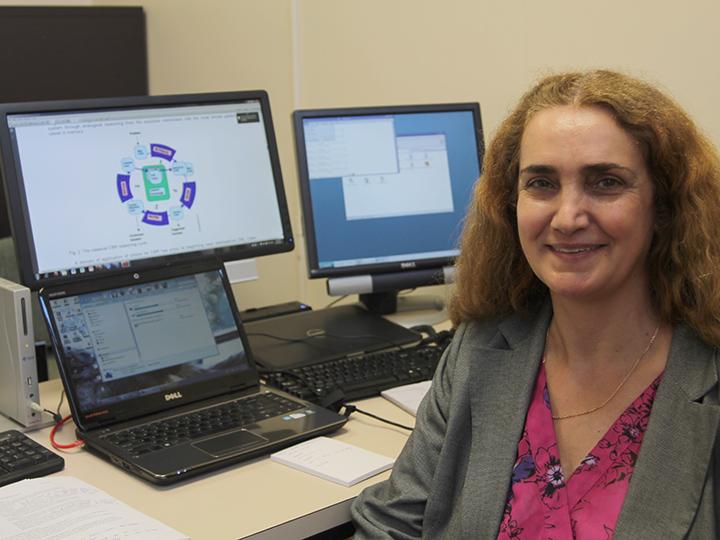Isabelle Bichindaritz received a $55,000 SUNY Innovative Instruction Technology Grant to support developing online courses in biomedical informatics.
Two SUNY Oswego projects are among the promising initiatives supported by the SUNY system’s 2016-17 Innovative Instruction Technology Grants.
Oswego initiatives earning awards are proposals by Isabelle Bichindaritz to support developing online courses in biomedical informatics and by Casey Raymond for a new method of creating online content for science and mathematics programs. Oswego’s two submissions were among the 35 SUNY approved out of 78 proposals.
The $55,000 grant to Bichindaritz, of Oswego’s computer science faculty, will support online courses in biomedical informatics, a fast-growing interdisciplinary field that studies and uses biomedical data, information and knowledge to improve human health. The project, “An Innovative Educational Framework for Interdisciplinary Educational Collaboration for Biomedical Data Science Based on Online Open Educational Resources,” will benefit students from Oswego and other colleges studying in this expanding field—one that addresses a sizable workforce need. Partners in the project to prepare coursework under this grant include Ioana Coman of Oswego’s computer science department and Frank Middleton from SUNY Upstate.
Oswego offers existing online graduate certificate programs in health information technology and integrated health systems, and has submitted a proposal to the state Education Department for a master’s program in biomedical and health informatics. SUNY Oswego is creating a Biomedical and Health Informatics Research and Educational Lab, working with other SUNY partners and funded with a $1.4 million SUNY 2020 award.
Bichindaritz noted the need to create online open educational resources to foster the creation and exchange of these resources between computer science and biomedical sciences, to spur efforts to increase access, completion and success for students and medical staff seeking professional development in an area requiring an increase in skilled workers.
“The sharing of educational resources allows students at a particular institution to benefit from many more courses than they are actually taking,” Bichindaritz explained. “That’s the advantage of sharing information. It’s like the difference between open source software and proprietary software. The benefit of open source is everybody can use it and benefit from it.”
SUNY Oswego would create or redesign online courses—proposed as “Biomedical Informatics Methods,” “Data Analytics” and “Introduction to Applied Biostatistics”—which would become available in the SUNY Learning Commons to a diverse group of learners. Bichindaritz hopes the project would increase completion rates of this specialized type of Open SUNY offering.
Creating variables
“Workshop Materials for the Creation of Algorithmic and Mathematical Problems in Blackboard,” the $5,800 project led by Raymond, will support a range of learners at Oswego and other colleges through creating faculty development materials for generating algorithmic and mathematical questions in a variety of science, technology, engineering and mathematics (STEM) courses in Blackboard Learn.
“The proposed project is to create workshop and tutorial materials for the creation of multiple dependent variables in Blackboard (Bb),” wrote Raymond—an Oswego chemistry faculty member and associate director of the college’s Honors Program—in his grant application. “I have developed a method using a spreadsheet and a text editor that allows question creation and importation into Bb. This method is different from other applications, software packages and Web sites, in that it allows for the creation of numeric questions.”
Raymond’s method would allow the generation of both complex, multistep questions and multiple-choice questions where students all receive different numerical values. “Both of these questions are valuable to student learning in STEM,” he noted.
The materials, which would include text documents and videos, would be made available to any interested users and potentially published to support the efforts of a wide variety of faculty and students, Raymond said.
Innovative Instruction Technology Grants fund campus innovations and initiatives in instructional technology that have the strongest potential to be replicated across SUNY’s 64 campuses, benefitting more students, faculty and staff. Grants totaled $716,000 this year.




